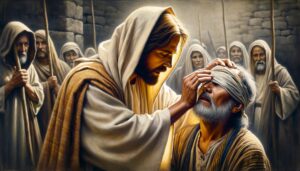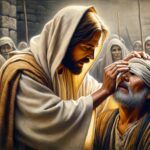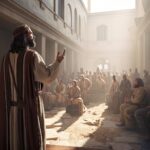John Chapter 9:1-41 King James Bible KJV

Jesus Heals a Man Born Blind, Jesus as the Light of the World, Spiritual Blindness, Faith and Transformation, Pharisees Question Jesus
John Chapter 9:1-41 King James Bible KJV. John Chapter 9 focuses on a miraculous healing of a man born blind and the theological implications of spiritual blindness and sight. The chapter explores themes of faith, revelation, and the identity of Jesus as the “Light of the World.” The story emphasizes the contrast between physical and spiritual blindness and how people respond to Jesus, revealing deeper truths about spiritual perception and rejection. The chapter emphasizes the need for humility, faith, and the willingness to be open to the truth Jesus reveals and teaches several key lessons:
- Jesus as the Light of the World: He brings both physical and spiritual sight to those who follow Him.
- Spiritual Blindness: Those who are confident in their own righteousness and understanding, like the Pharisees, may remain blind to the truth of who Jesus is.
- Faith and Transformation: The formerly blind man’s journey is one of progressive revelation and faith, from physical healing to recognizing and worshiping Jesus as the Son of God.
- Judgment: Jesus’ coming brings judgment, not in the sense of condemnation but in revealing the true spiritual condition of people. Those who admit their blindness are given sight, while those who refuse to acknowledge their need for Him remain in darkness.
John Chapter 9:1-41 King James Bible KJV
—————-

Jesus Heals a Man Born Blind – verses 1–7
Jesus encounters a man who has been blind since birth. The disciples ask Him whether the man’s blindness was caused by his sin or his parents’ sin, reflecting a common belief that suffering was directly linked to sin. Jesus refutes this assumption, saying that the man’s blindness was not due to sin but so “the works of God might be displayed in him.” Jesus then proclaims, “I am the light of the world” and heals the man by making mud with His saliva, applying it to the man’s eyes, and instructing him to wash in the Pool of Siloam. This healing symbolizes Jesus as the light that brings not just physical sight but spiritual enlightenment. The man’s healing is meant to display God’s power and serve as a sign of Jesus’ divine authority.
Key Themes:
- God’s Sovereignty in Suffering: Jesus teaches that suffering can have a divine purpose beyond human understanding.
- Jesus as the Light of the World: This miracle connects to Jesus’ earlier declaration (John 8:12), showing that He brings both physical and spiritual sight to those who believe in Him.

The Reaction of the Neighbors and Pharisees – verses 8–17
After the healing, the man’s neighbors are astonished and bring him to the Pharisees. The Pharisees, instead of marveling at the miracle, are divided because Jesus healed on the Sabbath, which they interpreted as a violation of the law. The Pharisees focus on the technicalities of the Sabbath rather than recognizing the significance of the miracle. Some of them question how a sinner could perform such signs, while others dismiss Jesus entirely.
Key Themes:
- Spiritual Blindness of the Pharisees: Despite the evidence of a miraculous healing, the Pharisees’ rigid interpretation of the law blinds them to Jesus’ true identity.
- Division Over Jesus: The miracle causes division, as some people begin to see Jesus as a prophet, while others reject Him due to their preconceived notions about the law.


The Pharisees Question the Man’s Parents – verses 18–23
The Pharisees, skeptical of the healing, call in the man’s parents to confirm whether he was truly born blind. The parents confirm his blindness but refuse to comment on how he was healed because they fear being expelled from the synagogue. The parents’ fear of the Jewish authorities highlights the growing opposition to Jesus and the social consequences for those who align with Him.
Key Themes:
- Fear of Persecution: The parents’ fear illustrates the cost of confessing faith in Jesus, as they could be ostracized from their religious community.
- Escalating Conflict: The Pharisees’ opposition to Jesus grows as they attempt to discredit the miracle and its implications.

The Man’s Faith and the Pharisees’ Blindness – verses 24–34
The Pharisees summon the healed man a second time, demanding that he acknowledge Jesus as a sinner for healing on the Sabbath. The man boldly declares, “One thing I do know: I was blind, but now I see.” He defends Jesus, arguing that a sinner could not perform such a miracle. Angered by his defense of Jesus, the Pharisees throw him out of the synagogue. The man moves from physical healing to a growing spiritual awareness, whereas the Pharisees, despite being religious leaders, remain spiritually blind. The healed man recognizes that Jesus is from God, while the Pharisees refuse to see the truth.
Key Themes:
- Faith and Courage: The formerly blind man stands firm in his faith despite pressure from the religious authorities. His boldness contrasts with his parents’ fear and the Pharisees’ refusal to see the truth.
- Spiritual Blindness: The Pharisees, though physically sighted, are blind to spiritual truth. Their rejection of Jesus is rooted in pride and adherence to religious tradition.

Jesus Reveals Himself to the Healed Man – verses 35–38
After the man is thrown out of the synagogue, Jesus finds him and asks if he believes in the Son of Man. The man asks who the Son of Man is, and Jesus reveals Himself, saying, “You have now seen him; in fact, he is the one speaking with you.” The man responds with faith, saying, “Lord, I believe,” and worships Jesus. This is a powerful moment of spiritual transformation. The man who was once blind now sees both physically and spiritually. He moves from knowing Jesus as a healer to recognizing Him as the Son of God and worships Him.
Key Themes:
- Faith in Jesus as the Son of God: The healed man’s journey from physical blindness to spiritual sight reaches its climax as he confesses faith in Jesus and worships Him.
- Revelation: Jesus actively seeks out the man to reveal His true identity, showing that faith is both a response to and a result of divine revelation.

Spiritual Blindness and Responsibility – verses 39–41
Jesus concludes by saying, “For judgment I have come into this world, so that the blind will see and those who see will become blind.” The Pharisees, overhearing this, ask if they are blind too. Jesus responds, “If you were blind, you would not be guilty of sin; but now that you claim you can see, your guilt remains.” Jesus uses this opportunity to contrast those who acknowledge their need for spiritual sight with those who claim to already have spiritual understanding but are blind to the truth. The Pharisees’ self-righteousness keeps them in spiritual blindness.
Key Themes:
- Judgment and Spiritual Sight: Jesus came to give spiritual sight to those who recognize their need for it and to expose the blindness of those who think they can see without Him.
- Accountability: The Pharisees’ guilt remains because they claim spiritual insight but reject the truth Jesus offers.
John Chapter 9:1-41 King James Bible KJV
1 And as Jesus passed by, he saw a man which was blind from his birth.
2 And his disciples asked him, saying, Master, who did sin, this man, or his parents, that he was born blind?
3 Jesus answered, Neither hath this man sinned, nor his parents: but that the works of God should be made manifest in him.
4 I must work the works of him that sent me, while it is day: the night cometh, when no man can work.
5 As long as I am in the world, I am the light of the world.
6 When he had thus spoken, he spat on the ground, and made clay of the spittle, and he anointed the eyes of the blind man with the clay,
7 And said unto him, Go, wash in the pool of Siloam, (which is by interpretation, Sent.) He went his way therefore, and washed, and came seeing.

8 The neighbours therefore, and they which before had seen him that he was blind, said, Is not this he that sat and begged?
9 Some said, This is he: others said, He is like him: but he said, I am he.
10 Therefore said they unto him, How were thine eyes opened?
11 He answered and said, A man that is called Jesus made clay, and anointed mine eyes, and said unto me, Go to the pool of Siloam, and wash: and I went and washed, and I received sight.
12 Then said they unto him, Where is he? He said, I know not.
13 They brought to the Pharisees him that aforetime was blind.
14 And it was the sabbath day when Jesus made the clay, and opened his eyes.
15 Then again the Pharisees also asked him how he had received his sight. He said unto them, He put clay upon mine eyes, and I washed, and do see.
16 Therefore said some of the Pharisees, This man is not of God, because he keepeth not the sabbath day. Others said, How can a man that is a sinner do such miracles? And there was a division among them.
17 They say unto the blind man again, What sayest thou of him, that he hath opened thine eyes? He said, He is a prophet.

18 But the Jews did not believe concerning him, that he had been blind, and received his sight, until they called the parents of him that had received his sight.
19 And they asked them, saying, Is this your son, who ye say was born blind? how then doth he now see?
20 His parents answered them and said, We know that this is our son, and that he was born blind:
21 But by what means he now seeth, we know not; or who hath opened his eyes, we know not: he is of age; ask him: he shall speak for himself.
22 These words spake his parents, because they feared the Jews: for the Jews had agreed already, that
if any man did confess that he was Christ, he should be put out of the synagogue.
23 Therefore said his parents, He is of age; ask him.

24 Then again called they the man that was blind, and said unto him, Give God the praise: we know that this man is a sinner.
25 He answered and said, Whether he be a sinner or no, I know not: one thing I know, that, whereas I was blind, now I see.
26 Then said they to him again, What did he to thee? how opened he thine eyes?
27 He answered them, I have told you already, and ye did not hear: wherefore would ye hear it again? will ye also be his disciples?
28 Then they reviled him, and said, Thou art his disciple; but we are Moses’ disciples.
29 We know that God spake unto Moses: as for this fellow, we know not from whence he is.
30 The man answered and said unto them, Why herein is a marvellous thing, that ye know not from whence he is, and yet he hath opened mine eyes.
31 Now we know that God heareth not sinners: but if any man be a worshipper of God, and doeth his will, him he heareth.
32 Since the world began was it not heard that any man opened the eyes of one that was born blind.
33 If this man were not of God, he could do nothing.
34 They answered and said unto him, Thou wast altogether born in sins, and dost thou teach us? And they cast him out.

35 Jesus heard that they had cast him out; and when he had found him, he said unto him, Dost thou believe on the Son of God?
36 He answered and said, Who is he, Lord, that I might believe on him?
37 And Jesus said unto him, Thou hast both seen him, and it is he that talketh with thee.
38 And he said, Lord, I believe. And he worshipped him.

39 And Jesus said, For judgment I am come into this world, that they which see not might see; and that they which see might be made blind.
40 And some of the Pharisees which were with him heard these words, and said unto him, Are we blind also?
41 Jesus said unto them, If ye were blind, ye should have no sin: but now ye say, We see; therefore your sin remaineth.
You must be logged in to post a comment.